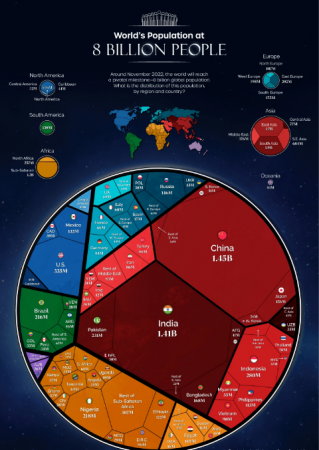
UNO: Do you think there are too many people on Earth—eight billion? As we pass this turning point on November 15, most experts agree that over-consumption of resources by the wealthiest citizens is a big issue.
The head of the United Nations Population Fund, Natalia Kanem, described the achievement of eight billion people as "an important milestone for humanity" and noted improvements in life expectancy and reductions in maternal and infant deaths.
"However, I know that not everyone can be happy about this opportunity. Some people worry that there are too many people in the world. I am clearly saying here that there is no reason to be afraid because so many All the people have been killed.
Also Read: Taliban reveal Mullah Omar's founder's hidden grave
Are we too much for the earth to support?
According to many professionals this question is wrong. We should be concerned about excessive consumption of the planet's resources by the richest among us, rather than the fear of overpopulation.
Who, what and how many are too many? Am I too much, if you must? Joel Cohen of the Population Laboratory at Rockefeller University said, "I don't think so.
He claimed that there are two sides to the question of how many people the Earth can support: natural constraints and human substitutes.
Humans consume far more biological resources, such as forests and land, than the planet itself as a result of our choices.
For example, excessive use of fossil fuels increases carbon dioxide emissions, which is the cause of global warming.
According to the Global Footprint Network and the WWF NGO, we would need a biocapacity of 1.75 earths to meet the needs of the current population in a sustainable way.
According to a recent UN climate report, one of the primary reasons for the increase in greenhouse gases is population growth. However, it is no less important than economic expansion.
Also Read: Katrina turns cleaner, you'll be shocked to see video
"We're stupid. We weren't foresighted. We're greedy. We don't use the data we have. There are decisions and issues, according to Cohen.
He disagrees with the notion that humans are a curse on the planet, arguing that people should have better choices.
According to Jennifer Scuba, a researcher at the Wilson Center think tank, "Our impact on the planet is driven far more by our behavior than by our numbers."
She continued, "returning to overpopulation is lazy and harmful," because it allows people in wealthier countries to shift responsibility for the problems facing the planet to those places where population growth is highest, while It is they themselves who consume the most.
Really, it's us. It's you and me, the outdoor pool I have, the air conditioning I use, and the meat I eat at night doing too much damage.
The Global Footprint Network and WWF estimate that we would need a capacity of only 0.8 Earths per year if everyone on the planet lived like an Indian citizen. If we all consumed at the same rate as an American citizen, we would need five Earths a year.
According to the United Nations, our planet is expected to be inhabited by 9.7 billion people by the year 2050.
Controlling fertility is one of the most difficult issues that come up when discussing population. Women's rights are fiercely supported even by those who think that the population of the earth should be reduced.
Population reduction is necessary, but only through "positive, voluntary, rights-respecting means," according to Robin Maynard, executive director of the NGO Population Affairs, and not through "reprehensible examples" of population control.
According to the NGO Project Drawdown, education and family planning are among the top 100 ways to stop global warming.
Demand for energy, transport, materials, food and natural systems will decrease with reduced population and sustainable levels of consumption.
Also Read: Sunni Muslim Iranian Spiritual Leader Requests Referendum on Protesters' Demands
"Every person who is born on the planet puts extra stress on the planet," says Vanessa Perez of the World Resources Institute.
It is a very complex issue, she acknowledged, and we must "reject the notion that the elite hold this narrative and say that we need to limit population growth in the South."
According to him, the most appealing discussion is about "distribution and equity", not the number of people.
Cohen notes that even though 800 million people are currently "chronically malnourished," we may still be feeding an additional 8 billion people.
The even more difficult question is, "Are we using our knowledge to make the human beings we have around us healthy, productive, happy, peaceful, and prosperous?" Avoids the idea that there are "too many" people.